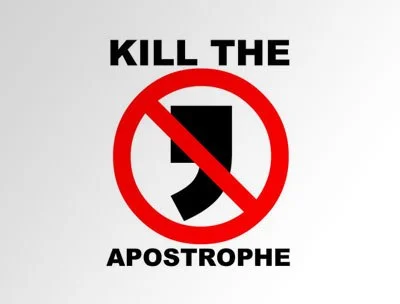Killing off the apostrophe
Is it time to kill off the apostrophe? I, for one, have always argued that we would be better off without that vexatious little punctuation mark, but it could be hard to engineer its demise.
I listened to an interview with Tiger Webb (ABC) in which he argued the case for losing the apostrophe completely as both unnecessary and confusing. He pointed out that he was not the first to make this plea, that various linguists, grammar writers and lexicographers had come to the conclusion that the apostrophe must go.
Tiger pointed out that the conventions of punctuation are not handed down from on high but have grown up over the years. We have had periods in English where we managed without the apostrophe. On the other hand, English texts of the late 1800s are in a lather of punctuation, whereas now the fashion is to do without it to the point where we are inclined to slip below the safety level and leave out punctuation that we actually need. That little voice in the mind needs guidance as to where to make a break and where to continue on, what needs to hang together and what needs to be separated.
There are two ways in which language change is effected. One is by decree. Some authoritative body announces to the populace that from hereon, this is how it should be done. The other is by community consensus. This is most commonly the way in which language change is brought about in English because we don’t have an Academy to lay down the law.
In this instance, however, the consequences have been disastrous because the community instinct has been, rather than to cut back on the apostrophe, to add one every time there is a final s. Thus the rise of the plural form with an apostrophe s, as in cat’s and dog’s.
The other complication is that we have lost the notion of the genitive as a case and read it too literally as the possessive. People possess things, so the man’s hat and the child’s toy present no problems for us. But the gate’s latch is stretching a friendship? It is even worse with abstract nouns. The philosophy’s main idea. Can philosophy possess something? Confusion reigns.
The only way to stop this is to get rid of the apostrophe entirely. Really, nothing would be lost. There is concern about contracted forms but context will sort them out. In fact there is no problem with don't, shouldnt, wouldnt, and couldnt. There is a slight anxiety about shell and hell where the eye will see the nouns, just from habit, before we adjust to reading them as contractions, but I think we would get used to that. I’ll will mostly be separated from ill because it will keep its capital I. Context will easily separate the contraction of I will from ill.
And that brings us to the pair that caused all the trouble to begin with – its and it’s. Again context should sort it out. I love its shiny cover. Its going to rain today. No problem!
If general currency is not going to work for us this time, we need the authoritative body. In Australia this has to be the Education Council of Government Ministers. They have to tell the schools to cut out the apostrophe.
They also have to provide the children brought up in the new punctuation system with some statement as protection, because there will be an initial period where the older generation see it as the ignorance of the young rather than a conscious choice by the community.
Sadly, I can’t see that happening.
